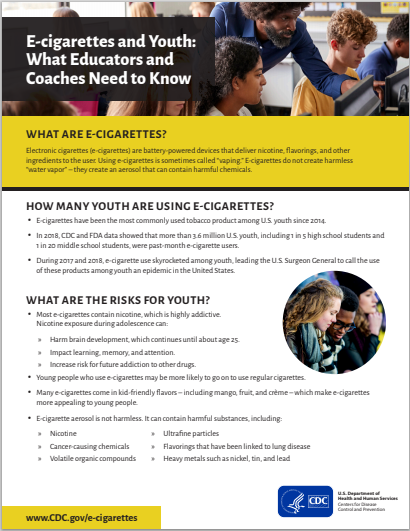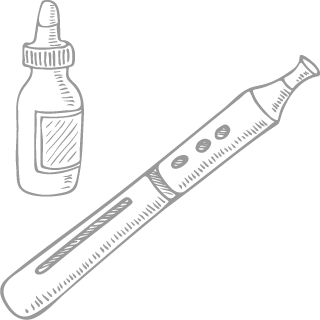Educator Resources
Educate yourself first. Get the facts on vaping so you know what you’re talking about when you approach the discussion with students. As a teacher, you are role model and responsible for shaping many of your student’s ideas and behaviors with your own actions.
Students Are Hiding Vaping Devices in Plain Sight
Educational Materials & Resources
Truth Initiative
Vaping: Know The Truth
The Truth Initiative and Kaiser Permanente in collaboration with the American Heart Association have launched this free digital learning experience as part of Truth Initiative’s nationally recognized truth campaign available at no cost to students and teachers. This self-led interactive digital curriculum is for grade levels 8-12, can be completed in approximately 30-60 minutes, and aligns to national health education standards. In addition to encouraging students to live vape-free lives it offers resources to help young people who are currently using e-cigarettes to quit through Truth’s first-of-its-kind text message youth quit vaping program called This is Quitting already helping over 500,000 youth and young adults on their journeys to quit.
Centers for Disease Control [CDC]
Know the Risks: A Youth Guide to E-cigarettes
CDC’s Office on Smoking and Health (OSH) developed this presentation to educate youth on e-cigarettes and what youth can do to avoid all tobacco products.
Scholastic
Get Smart About Tobacco, grades 3-5
This poster/teaching guide and accompanying take-home pages were developed by the CVS Health Foundation in collaboration with Scholastic Inc. It contains lesson plans and worksheets that help teach students about the dangers of tobacco while supporting your classroom curriculum with activities that reinforce skills in scientific literacy, health, reading comprehension, writing, and critical thinking. It can also be used as a take-home family package to extend learning at home.
Stanford Medicine - Tobacco Prevention Toolkit
Vaping Prevention Online Lessons
This is a free course for teaching students remotely about the harms of vaping. Includes lesson plans for teachers. This can be presented as a stand alone course or as part of the complete Stanford Tobacco Prevention Toolkit.
Centers for Disease Control [CDC]
E-Cigarettes and Youth: What Educators and Coaches Need to Know

Take Down Tobacco
Campaign for Tobacco-Free Kids
The Campaign for Tobacco-Free Kids developed a platform for empowering young people to fight Big Tobacco. Young people can access tools and resources to create a movement with peers, teachers, parents, healthcare providers, advocates, and elected leaders to work together toward a tobacco-free generation. Resources are available for the National Day of Action held each year on April 1st.
Scholastic
E-Cigarettes, A Dangerous Trend
Help students learn why e-cigarettes aren’t harmless. A complete lesson plan with printable materials including critical reading questions, writing prompts, student activities, and state standards info. Adaptable to grades 6-12.
Stanford REACH Lab
You and Me, Together Vape Free
This curriculum is part of the Stanford Tobacco Prevention Toolkit and is a 6-lesson evidence-based curriculum created by the Stanford REACH Lab. Lessons are mapped to National Common Core State Standards, Health Education Content Standards, and the National Health Education Standards. They offer elementary, middle and high school versions as well as other languages/cultures.
Scholastic
The Real Cost of Vaping
The FDA worked with Scholastic to develop free youth e-cigarette prevention resources for middle and high school students. The materials include lessons grounded in core subjects, infographics, and short videos.
Scholastic
Heads Up – Resources for Teachers
Lesson plans and student activities about e-cigarettes and other drugs.
Scholastic
E-Cigarettes, What You Need To Know
Lesson plans and materials to use with students grades 6-12.
National Institute of Health
Classroom Resources on Drug Effects
Lessons, activities, and drug facts to educate teens about the effects and consequences of drug use.
CATCH My Breath: E-Cigarette Prevention
Interactive Learning Resources to Support Curriculum
ASPIRE
Anything is possible with an online, bilingual tool that helps middle and high school students start living tobacco free.
smokeSCREEN: A prevention game
smokeSCREEN addresses the range of challenges that young teens face, with a dedicated focus on youth decision-making about tobacco smoking (conventional cigarettes, electronic cigarettes, flavored tobacco products), and includes strategies for both smoking prevention and cessation.
Get the Facts about Vaping/JUULing
Vaping/JUULing

AKA:
E-cigs, electronic cigarettes, JUULs
What is Vaping?
Vapor products produce aerosol by heating a liquid solution. Users inhale the aerosol into the lungs. There are chemicals and nicotine in the aerosol, not just water vapor.
Laws & Legal Status
The law applies to what is being vaped in an e-cig. Meaning, in Washington State, marijuana vaping is legal for adults over 21, and vaping nicotine is legal for adults over 18. As of Jan. 1, 2020 it will be illegal to sell or give tobacco or vaping products to people under age 21.
Affect on Your Developing Brain
While the brain is still developing, young people are at higher risk for long-term, long-lasting effects of exposure to nicotine, including an increased risk of addiction. Nicotine can harm the parts of the brain that control attention and learning.
Is it Addicting?
Yes. Nicotine is addicting to young people and adults. Young people's brains are growing faster than adult brains, and are therefore can get addicted more easily than adults.
Affect on Your Body
Scientists are still trying to understand the long-term health effects of vaping, both for users and those exposed to vaping second-hand. Vaping is known to have negative affects on respiratory health because of the harmful and potentially harmful chemicals in the e-cigs, including nicotine and other chemicals linked to lung disease.
What if someone needs help?
Teen Link: 1-866-Teenlink
(1-866-833-6546)
Available 6pm–10pm PST
Teen Talk: 360-397-2428
Available Monday –Thursday 4-9pm, Friday 4-7pm PST
Where to go for more info
Need Additional Resources?
Have a question that we didn’t answer? Submit it to preventcoalition@esd112.org and a Youth Now coordinator will get back to you with answers straight to your inbox.

